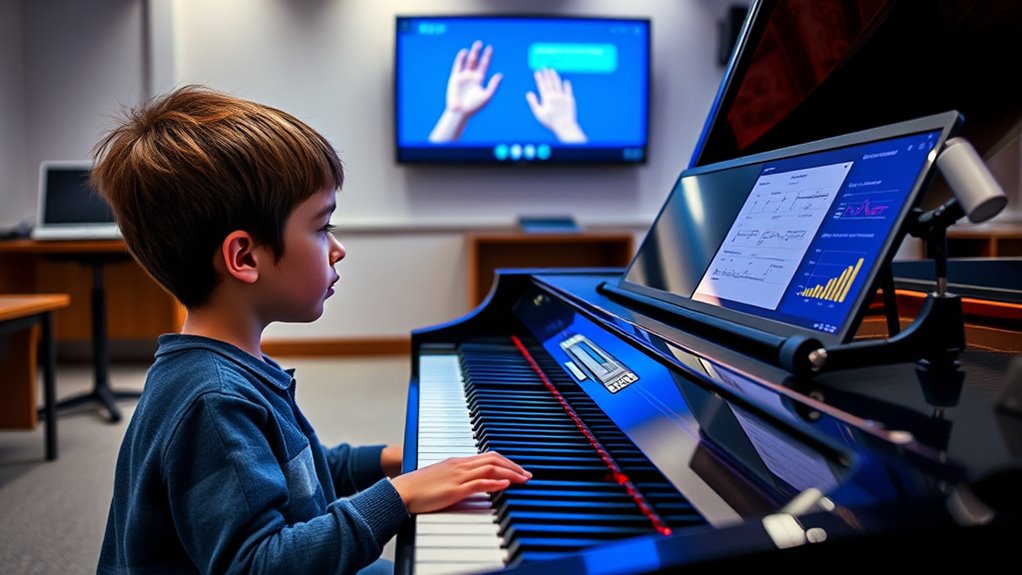Using AI tutors for learning instruments lets you practice anytime and anywhere, removing traditional barriers. They provide real-time feedback, helping you correct mistakes instantly and track your progress over time. AI tools adapt to your skill level, offering personalized sessions that keep you motivated and focused. By incorporating visual aids and innovative techniques, these tutors make learning more engaging and efficient. Keep exploring to discover how these advanced tools can transform your musical journey.
Key Takeaways
- AI tutors enable personalized instrument practice by analyzing performance and adjusting difficulty in real time.
- They provide instant feedback on technique, pitch, and timing to correct mistakes immediately.
- Virtual practice offers flexible, 24/7 access, fitting learning into busy schedules.
- Visual aids and slow-motion playback help clarify complex passages and improve understanding.
- Data tracking and goal setting motivate learners by showing progress and optimizing practice routines.

Have you ever wondered how artificial intelligence is transforming the way we learn to play instruments? One of the most exciting developments is the rise of AI-powered tutors that offer virtual practice sessions tailored specifically to you. With virtual practice, you no longer need to be limited by time or location; you can practice anytime, anywhere, and still get high-quality guidance. These AI tools simulate real-time playing environments, allowing you to run through scales, songs, or exercises as if you’re in a studio or classroom. They provide instant feedback, helping you correct mistakes right away, which accelerates your learning process. Instead of waiting for a weekly lesson, you get continuous support that keeps you motivated and on track. Plus, virtual practice makes it easier to fit learning into your busy schedule, making consistent progress more achievable.
What truly sets AI tutors apart is their ability to give personalized feedback. When you practice with traditional methods, feedback can be delayed or generalized, leaving you unsure about what to improve. AI tutors analyze your performance in real time, listening to your playing and pinpointing specific issues such as timing, pitch, or technique. This targeted feedback helps you understand exactly what needs work, so you can focus your efforts effectively. The more you practice, the smarter the AI becomes, adapting to your skill level and adjusting difficulty to challenge you without causing frustration. This personalized approach keeps your practice sessions engaging and productive, ensuring you’re always working on the right skills at the right time.
In addition to immediate feedback, AI tutors often include visual aids like finger placement diagrams, sheet music, or slow-motion playback to enhance your understanding. These tools complement your virtual practice, making complex passages easier to learn. The AI also tracks your progress over time, giving you detailed insights into your strengths and weaknesses. This data-driven approach helps you set realistic goals and see tangible improvements, boosting your confidence along the way. Because AI tutors are available 24/7, you can practice whenever it’s convenient for you, eliminating barriers that might prevent consistent learning. As you engage with these technologies, you’ll notice how quickly your skills develop, thanks to the combination of virtual practice environments and continuous, personalized feedback that keeps you motivated and focused. Additionally, leveraging performance tuning techniques from automotive tuning can inspire innovative ways to optimize your practice routines for better results.
Frequently Asked Questions
How Do AI Tutors Adapt to Different Learning Styles?
AI tutors adapt to your learning style by providing personalized feedback that targets your strengths and weaknesses. They also adjust difficulty levels based on your progress, ensuring you stay challenged without feeling overwhelmed. This dynamic approach helps you learn more effectively, keeping you engaged and motivated. As you practice, the AI continuously analyzes your responses, tailoring lessons to fit your unique needs and optimizing your musical growth.
Are AI Tutors Suitable for All Age Groups?
You might think AI tutors are a one-size-fits-all solution, but they’re not suitable for every age group. They provide emotional support and cultural relevance, making learning engaging for many. Still, younger children may need more human interaction, and older adults might prefer personalized, real-world guidance. Keep in mind, AI tools work best when complemented by human teachers, ensuring everyone gets the support they need to thrive.
What Are the Privacy Concerns With Ai-Based Learning Tools?
You should be aware that AI-based learning tools raise privacy concerns, especially around data privacy and user confidentiality. These platforms collect personal information, learning habits, and progress data, which could be vulnerable to breaches or misuse. To protect yourself, verify the platform has strong security measures, clear privacy policies, and transparent data handling practices. Being cautious helps you maintain control over your information and prevents potential privacy violations.
How Cost-Effective Are AI Tutors Compared to Traditional Lessons?
You might find it surprising, but AI tutors often cost less than traditional lessons due to flexible pricing models and reduced overhead. This makes learning more accessible, especially for those facing accessibility issues, as you can access high-quality instruction anytime and anywhere. While traditional lessons usually involve scheduling and travel costs, AI tutors offer a more cost-effective, convenient option that fits various budgets, making skill development more affordable for everyone.
Can AI Tutors Replace Human Instructors Entirely?
AI tutors can’t fully replace human instructors because emotional intelligence plays a crucial role in understanding your unique needs and fostering creative expression. While AI can provide personalized feedback and support, it lacks the empathy and nuanced communication that humans offer. You benefit most when AI complements human teaching, helping you develop technical skills while your instructor nurtures emotional growth and creative exploration.
Conclusion
Just like a skilled guide helps you navigate new terrain, AI tutors make learning instruments easier and more personalized. With their instant feedback and tailored lessons, you’ll find yourself progressing faster and more confidently. Embrace these tools as your trusty companions on your musical journey, turning practice into an exciting adventure. As you continue to learn, remember that AI tutors are here to support you every step of the way, like a lighthouse guiding you through the night.









